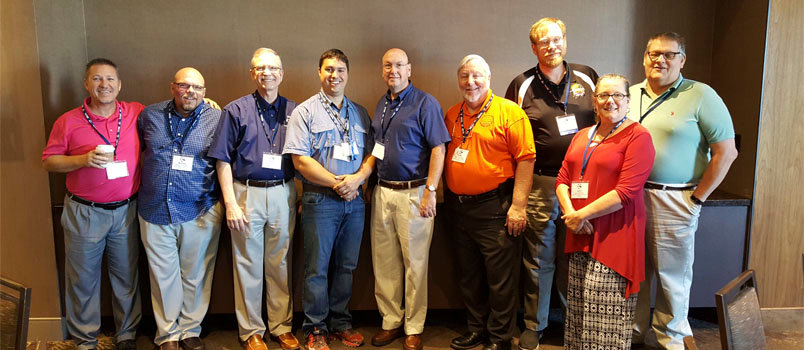 Several Georgia Baptist associational missionaries gathered in Phoenix for the annual Southern Baptist Conference of Associational Leaders meeting. Pictured left to right are: Greg Bentley, Altamaha/New Sunbury Association; Bobby Braswell, Middle Baptist Association; Ray Gentry, Southside Baptist Network; Jacob Brimm, pastor of Byromville Baptist Church; Gary Leutzinger, Houston Baptist Association; Andy Perryman, Georgia Baptist Association; Hans Wunch, Mallary Baptist Association, and Freddy and Lynn Gardner, Tattnall-Evans Baptist Association. ANDY PERRYMAN/Special[/caption]
Several Georgia Baptist associational missionaries gathered in Phoenix for the annual Southern Baptist Conference of Associational Leaders meeting. Pictured left to right are: Greg Bentley, Altamaha/New Sunbury Association; Bobby Braswell, Middle Baptist Association; Ray Gentry, Southside Baptist Network; Jacob Brimm, pastor of Byromville Baptist Church; Gary Leutzinger, Houston Baptist Association; Andy Perryman, Georgia Baptist Association; Hans Wunch, Mallary Baptist Association, and Freddy and Lynn Gardner, Tattnall-Evans Baptist Association. ANDY PERRYMAN/Special[/caption] Ray Gentry sees the changing landscape of associational missions. He's heard the whispers, just like you have. Yet, he's convinced the job connects with a familiar biblical name. Especially relevant, the name could well be that of the first associational missionary.
"Paul concerned himself with the spiritual condition of the churches he started," notes Gentry, director of missions for Southside Baptist Network, based in McDonough. "In the same way, associational missionaries today are concerned about their local churches. They want to teach those congregations how to reach their Jerusalem, Judea, Samaria, and uttermost parts of the earth."
The annual gathering of the Southern Baptist Conference of Associational Leaders serves that purpose. In it, Gentry serves as executive director the group, a position he's held since July 1, 2015.
Associational work today, Gentry points out, requires missionaries to be flexible and constant learners. That's where the SBCAL – the oldest and largest national Southern Baptist professional organization for directors of missions – comes in. So, the group holds its annual meeting each year in conjunction with the Southern Baptist Convention.
"SBCAL finds ways to assist associational leaders in advancing the gospel through leadership development, ministry partnerships, and networking," he says. "The annual conference provides inspiration, equipping, networking, and fellowship."
Ministry in pretty much every context, including associational missions, remains in flux. Yet, the bedrock for successful ministry lays in a mental image. It's of Jesus sitting around a fire, eating fish and breaking bread with His disciples as they talk.
Relationships remain key.
Recalling the various breakout sessions offered at the SBCAL gathering, Bobby Braswell of Middle Baptist Association talked about one in particular.
"It stressed the importance of relationships with pastors, those you work with," he says. "We're here to strengthen and serve churches, equip leaders."
Braswell does that one way through peer learning groups.
"We have roundtable discussions with pastors, focusing on revitalization. I train search committees and provide deacon training. In addition, we provide demographic studies for churches.
" consider themselves servants and partners with churches. We try to think of their needs."
Every other year, the association sponsors a conference focusing on strengthening churches. In 2016 Southeastern Baptist Theological Seminary professor Alvin Reid served as guest speaker. Chuck Lawless, dean and vice president of Graduate Studies and Ministry Centers at Southeastern, fills that role at the 2018 conference. Sunday School growth aficionado Josh Hunt will also appear at the 2018 event.
Andy Perryman, director of missions for Georgia Baptist Association, says churches may not realized the resources available to them.
"We offer many resources that are under-utilized. In addition, the fellowship opportunities for pastors – especially bivocational – are unmatched.
"We all need somebody to talk to," he adds.
Ministry begins at the ground level. Consequently, those in Braswell's and Gentry's shoes understand the ground can at times feel like shifting sand.
"There are always common challenges for associations," Braswell says. "But, it's also contextual. Many churches I serve exist in rural areas across three counties. Effingham County contains suburban Savannah as well."
Rural churches face different challenges, he added. One example is finding a bivocational pastor a job in addition to his pastoral responsibilities. "It's tough for them to get work," he says. "It seems like it helps if the pastor is able to teach in a school."
Perryman notices the same situation. Furthermore, his 17 years of experience tells him the challenges may grow.
"The differences are immense between metro and rural associations," he says. "And, cooperation among churches has diminished over the years."
As the landscape has changed for pastors, so it has for associational missionaries. Therefore, a connection exists in a response, and a shared word between Braswell and Gentry.
"An effective associational missionary, like an effective pastor, listens, reads, and learns from others," says the Southside director. "But, he contextualizes the information to suit his mission field."
Associational missionaries, Gentry stressed, need to "sharpen their saw, keep relevant, work hard, and meet the needs of pastors and churches."
"They must nurture those relationships with pastors, staff, and church leaders. Effective, relevant directors seek to be mission strategists. It assists churches in reaching their local mission field for Christ.
"They do so through community impact, church, planting, church revitalization, and leadership development."
Those were the same characteristics, he points out, important to the Apostle Paul.